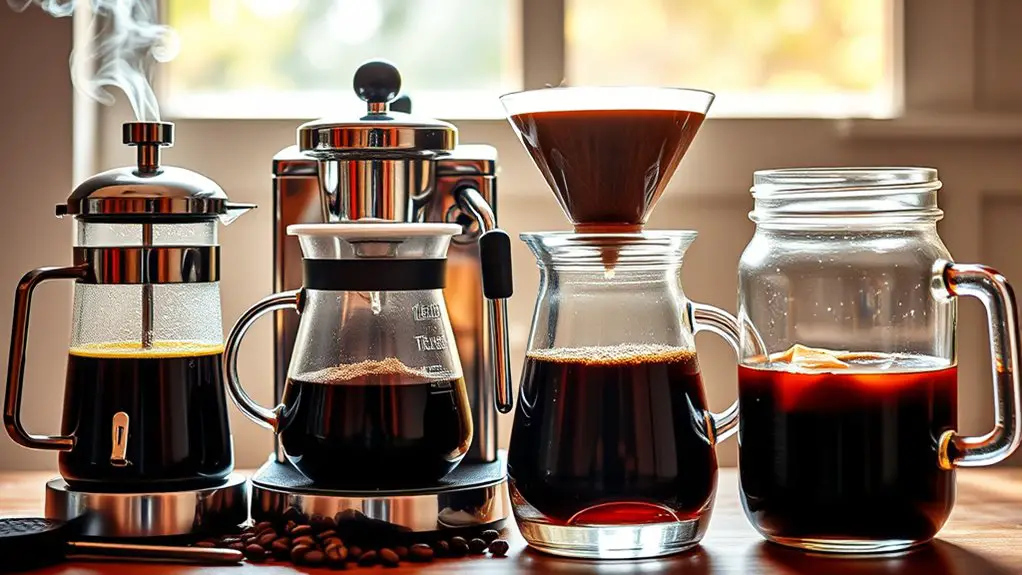Different brewing methods considerably affect caffeine content in your coffee. Espresso packs a concentrated punch with higher caffeine due to pressure extraction, while drip coffee provides a consistent caffeine range from 80 to 120 milligrams per cup. French press enhances flavor and caffeine through a longer steeping process. Cold brew's extended steep results in smoother, less acidic coffee with more caffeine. The Aeropress allows you to customize your brew for desired strength. There's more to discover about each method's unique benefits.
Espresso: A Quick Shot of Caffeine
When you think of a quick caffeine boost, espresso often comes to mind, and for good reason. This concentrated coffee drink is a product of precise espresso extraction, where hot water is forced through finely-ground coffee under pressure. The intensity of this method results in a robust flavor and heightened caffeine content compared to other brewing methods. Different espresso varieties, such as single origin or blends, can also affect caffeine levels and taste profiles. For instance, a dark roast may provide a more intense flavor with slightly less caffeine than a lighter roast due to the roasting process. Understanding these nuances empowers you to select the ideal espresso that aligns with your caffeine preferences and flavor desires. Choosing the right espresso beans, such as freshness and roast level, is essential for maximizing both flavor and caffeine content.
Drip Coffee: The Classic Brew
Drip coffee is arguably one of the most popular brewing methods worldwide, accounting for a significant portion of daily caffeine consumption. This method typically brews coffee at a consistent temperature, usually between 195°F and 205°F. This precise brewing temperature plays an essential role in extracting caffeine and flavor compounds from the coffee grounds. Studies show that, depending on the coffee-to-water ratio and brewing time, a standard 8-ounce cup of drip coffee can contain anywhere from 80 to 120 milligrams of caffeine. By controlling variables like grind size and water temperature, you can optimize your cup. If you're looking for a reliable caffeine source that fits seamlessly into your routine, drip coffee remains a classic choice with versatile brewing options.
French Press: Rich Flavor and Potent Boost
Although the French press may require a bit more hands-on involvement than other brewing methods, it delivers a rich and robust flavor that many coffee enthusiasts swear by. The key to its potency lies in the coarse grind of the coffee beans, which allows for ideal extraction during the brewing process. By steeping the grounds for about four minutes, you're maximizing the caffeine content, as the longer steeping time helps release oils and flavors that contribute to the coffee's depth. This method typically yields a higher caffeine concentration compared to drip coffee, making it a favorite for those seeking an invigorating boost. Additionally, the increased energy from the caffeine can lead to heightened hunger stimulation, making this a great choice for those who enjoy a hearty breakfast. Ultimately, mastering the French press can reveal a uniquely satisfying coffee experience that caters to your taste preferences.
Cold Brew: Slow Steeping for Smooth Caffeine
As you explore different brewing methods, cold brew stands out for its unique approach to extracting flavors and caffeine. This method typically requires a steeping time of 12 to 24 hours, allowing for a gradual extraction that results in a smoother, less acidic profile. The cold brew benefits include higher caffeine content compared to traditional brewing methods, as the longer steeping time can yield more caffeine from the coffee grounds. Additionally, the cold extraction process preserves delicate flavors, creating a revitalizing beverage that's easy on the palate. For those seeking a caffeine boost without the bitterness, cold brew offers a liberating choice, allowing you to enjoy your coffee in a way that aligns with your taste preferences and lifestyle.
Aeropress: Versatile Brewing With Variable Strength
The Aeropress offers a dynamic brewing experience that allows you to customize the strength and flavor profile of your coffee. By adjusting brewing ratios, you can control the caffeine content and taste. Here's how different ratios affect your brew:
| Brewing Ratio | Caffeine Content | Flavor Profile |
|---|---|---|
| 1:10 | High | Bold, intense |
| 1:15 | Moderate | Balanced, smooth |
| 1:20 | Low | Light, floral |
| 1:12 | Medium | Rich, complex |
| 1:18 | Standard | Well-rounded |
Experimenting with these ratios lets you find the perfect balance for your taste preferences, giving you the freedom to craft your ideal cup. The Aeropress truly empowers you to explore coffee's vast flavor landscape.
Frequently Asked Questions
Does Caffeine Content Vary by Coffee Bean Type?
Yes, caffeine content varies by coffee bean type. Arabica beans typically have lower caffeine profiles compared to Robusta beans, which are stronger and bolder, leading to distinct flavor differences that impact your overall coffee experience.
How Does Grind Size Influence Caffeine Extraction?
Think of grind size as the key to a locked treasure chest. Finer grinds enhance extraction efficiency, releasing more caffeine, while coarser grinds slow the process, resulting in less caffeine per cup. Choose wisely for your brew!
Can Brewing Time Affect Caffeine Levels?
Yes, brewing time considerably affects caffeine levels. Longer brewing techniques enhance extraction efficiency, leading to higher caffeine concentrations. However, over-extraction may result in undesirable flavors, so balancing time is essential for ideal taste and caffeine yield.
What Role Does Water Temperature Play in Caffeine Extraction?
Like a key opening a door, water temperature greatly influences caffeine extraction. Higher temperatures accelerate the process, allowing more caffeine to dissolve, while cooler temps result in a slower, less efficient extraction.
Are There Any Health Effects From High Caffeine Consumption?
High caffeine consumption can lead to health risks like increased heart rate and anxiety. Your caffeine tolerance plays a significant role; exceeding it may result in adverse effects. Moderation is key to maintaining overall well-being.
